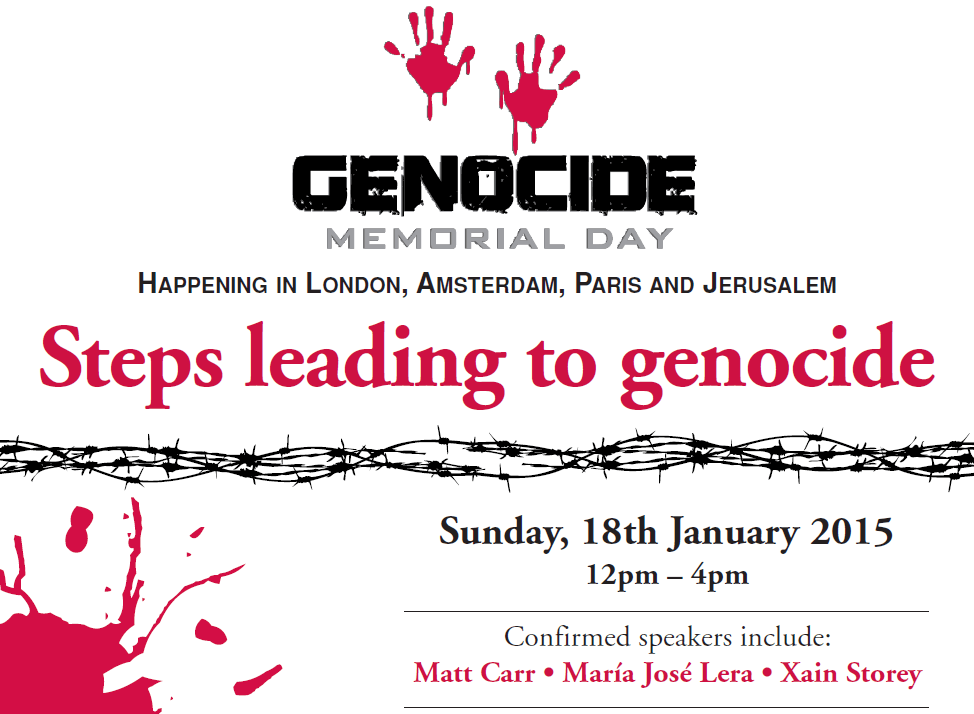The slippery slope of demonising communities with the aim of inciting hostility against them will once again be the focus of this year’s Genocide Memorial Day, to be observed later this month.
Simultaneous events are to be held in London, Amsterdam, Brussels, Paris and Jerusalem to highlight “steps to Genocide” – the political, social and economic processes that precede all genocides and which provide an indicator of looming crises.
IHRC is encouraged by the fact that GMD has again expanded to take in more cities around the world and sees this as evidence of the increasing awareness in communities of the kind of discrimination and oppression that leads to crimes against humanity.
Established in 2010, Genocide Memorial Day is intended to give people an opportunity to recall man’s inhumanity to man. It is unique in that remembrance is not limited by the background of either the victims of the genocides or the perpetrators of any of the genocides. GMD rejects the notion that there is a hierarchy of victim depending on their background. More importantly, IHRC aims to highlight the processes that lead to genocides and genocidal acts so as to flag up the potential for future crises.
For the first time the occupied city of Jerusalem will be among the cities marking Genocide Memorial Day. As a city which encapsulates an ongoing genocide, Jerusalem is an poignant choice of location. Tens of thousands of Palestinians have been killed by Israel in acts of genocide since the Zionist state came into being in 1948. The Zionist ideology on which Israel is founded is by nature genocidal in that it envisages the existence of a “Jewish state” at the expense of the native inhabitants. During and since the creation of Israel hundreds of thousands of Palestinians have systematically been displaced to make way for Jews to settle on their land.
Israel annexed East Jerusalem in 1967 in defiance of international law and its political leaders proclaimed the city Israel’s “eternal, undivided capital.” Since then it has pursued an aggressive policy of Jewish settlement with the result that today some 200,000 Jews reside in the occupied city. Attempts by the Palestinians to resist their expulsion and marginalisation has met with brutal military responses.
Raza Kazim of IHRC said: “I would urge that people concerned with xenophobic and racist oppression and the resistance to it to come and participate with great minds, thinkers and activists as to how we can better understand the steps that lead to genocidal acts in order to resist them better in the future. Genocide is an issue that is a direct attack on humanity, and thus needs a rigorous response from all the different communities comprising humanity”.
The London event will feature speeches by Xain Storey, a journalist and historian specialising in the First Nations of North America, Professor Maria-Jose Lera from Spain’s Seville University who will address the genocide of Jews and Muslims in Andalucia, and author Matt Carr who will discuss the genocide of Moriscos (Muslim converts to Christianity) in Andalucia.
Notes to editors:
Date: Sunday 18th January 2015
Time: 12.00pm – 4.00pm
Venue: University College London, Cruciform Lecture Theatre, Gower Street, London WC1E 66BT
For more information visit https://ihrc.org.uk/events/11311-genocide-memorial-day-2015 or contact Nadia in the Press Office on +44 20 8904 4222 or email nadia@ihrc.org
If you want to bring a fixed camera please let the Press Office know in advance. Video, audio and photographs will be available after the event. The programme will be streamed live at https://www.ihrc.tv
Members of the general public wanting to attend should register at https://www.eventbrite.co.uk/e/genocide-memorial-day-2015-tickets-15054355984
——————————————————————————————
IHRC is an NGO in Special Consultative Status with the Economic and Social Council of the United Nations.
Islamic Human Rights Commission
PO Box 598
Wembley
HA9 7XH
United Kingdom
Telephone (+44) 20 8904 4222
Email: info@ihrc.org
Web: www.ihrc.org
Twitter @ihrc







